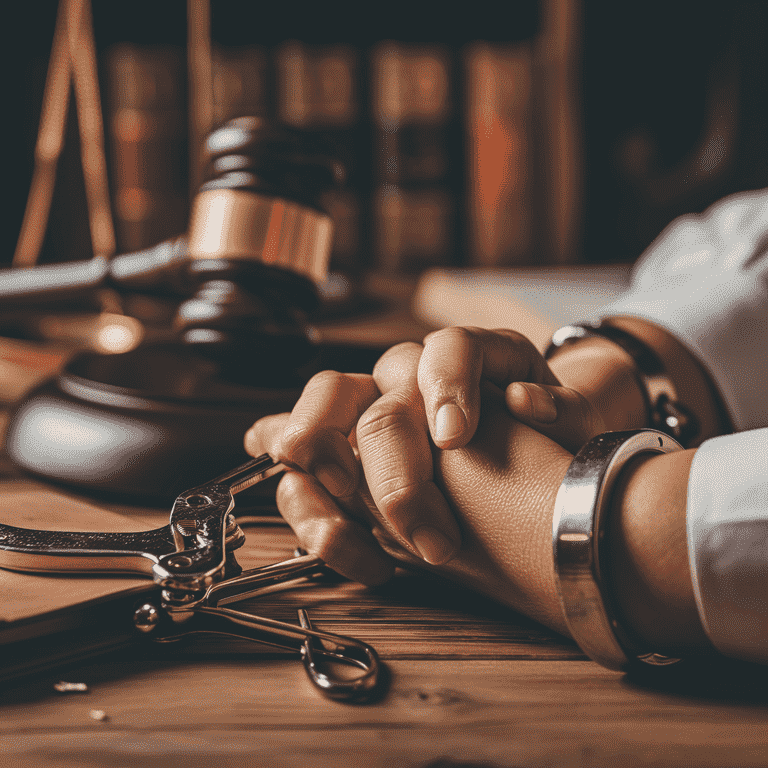Bail bonds are a crucial aspect of the criminal justice system.
They are a financial agreement. This allows a defendant to be released from custody while awaiting court proceedings.
Essentially, they are a promise made by the defendant or a guarantor to pay a set amount.
They promise to pay if the defendant fails to appear in court.
Note: Make sure to also check out our Nevada Bail System post while you’re here.

 Importance of Bail Bonds for Defendants in Las Vegas
Importance of Bail Bonds for Defendants in Las Vegas
Many defendants in Las Vegas rely on a bail bond to resume everyday life while navigating the legal process. It enables them to work, spend time with family, and consult with their attorney outside jail. Understanding bail bonds can significantly impact the course of a defendant’s case.

Basics of Bail Bonds in Las Vegas
Definition and Purpose of Bail Bonds
A bail bond is a financial guarantee. It is made by a defendant or a third party to ensure the defendant’s appearance in court. The bond allows the defendant temporary freedom and is forfeited if they fail to appear in court.
The Bail Bond Process: A Step-by-Step Overview
Bail bonds involve several steps from arrest to obtaining freedom:
Arrest and Booking
The process begins with the defendant’s arrest and booking into the jail system. Here, personal information, fingerprints, and photographs are recorded.
Setting Bail Amount
A judge or a set schedule determines the bail amount. They base it on the crime, the defendant’s record, and other factors.
Contacting a Bail Bond Agent
If the defendant cannot pay the full bail amount, they or their family can contact a bail bond agent.
Types of Bail Bonds in Las Vegas
Las Vegas offers various types of bail bonds, each catering to different situations:
Cash Bonds
Direct payment of the total bail amount in cash. This is often refunded after the defendant’s court appearances.
Surety Bonds
A bail bond agent pays the bail for a fee, usually a percentage of the total bail amount. The agent guarantees the court that the defendant will appear.
Property Bonds
It involves using property as collateral instead of cash. The property must have a value at least equal to the bail amount.
Federal Bail Bonds
Used in federal cases, these bonds are more complex and usually involve higher risk and cost.
Immigration Bail Bonds
These bonds are specific to immigration cases. They ensure that the defendant will attend all immigration hearings.
The bail bond process in Las Vegas can be complex. Understanding these basics is the first step to navigating it effectively.
The following sections will explore choosing a bail bond agent and understanding legal responsibilities.
They will also cover more. Stay tuned for a comprehensive view of the Las Vegas bail bond system. It’s designed to guide defendants through each process stage.

Choosing a Bail Bond Agent
What to Look for in a Bail Bond Agent
Selecting the right bail bond agent is crucial. Here are vital factors to consider:
Licensing and Experience: Verify that the agent is licensed in Nevada and has substantial experience handling bail bonds.
Reputation and Reviews: Research their reputation online, read reviews, and ask for referrals.
Fee Structure and Payment Options: Understand their fees (typically 10-15% of the bail amount) and payment options to avoid surprises.
How to Find a Reputable Bail Bond Agent in Las Vegas
Online Research: Start with a simple internet search.
Referrals: Ask friends or your attorney for recommendations.
Check Reviews: Websites like Yelp or Google Reviews can provide valuable insights.

Legal Responsibilities and Obligations
Responsibilities of the Defendant
As a defendant, you must:
Appearing in Court: Attend all scheduled court appearances without fail.
Compliance with Bail Conditions: Adhere to additional conditions the court sets, like travel restrictions or regular check-ins.
Consequences of Failing to Meet Obligations
Not meeting these obligations can lead to severe consequences:
Revocation of Bail: Your bail can get revoked, leading to immediate arrest.
More Legal Penalties: Failure to appear can result in extra charges.

Costs and Fees Associated with Bail Bonds
Standard Bail Bond Fees in Las Vegas
In Las Vegas, bail bond agents typically charge:
Premium: 10-15% of the bail amount, non-refundable.
Collateral: Property or valuables to secure the bond.
Additional Costs and Penalties
Be aware of potential extra costs:
Late Fees and Interest: For delayed payments on the premium.
Collateral Requirements: If you fail to appear in court, collateral can be seized.
Penalty for Skipping Bail: Additional legal penalties, including fines or arrest.
In these sections, we’ve covered the critical aspects of choosing a bail bond agent. We’ve also covered understanding your legal responsibilities and obligations, and the costs of bail bonds.
Navigating the bail bond system requires knowledge, careful consideration, and responsible action. Stay informed and seek professional advice when needed.

Navigating the Court System
Understanding the Role of Bail in the Judicial Process
Bail is not just about freedom; it’s an integral part of the justice system. It ensures that a defendant returns for court proceedings. It allows them to prepare their case outside of custody. Here’s how bail fits into the larger picture:
Presumption of Innocence: Bail respects the principle that you are innocent until proven guilty.
Preparation for Defense: Being out on bail allows better communication with your lawyer and more time to prepare your defense.
Interaction with Legal Representation
Maintaining a solid line of communication with your lawyer is vital:
Communicating with Your Defense Attorney: Regular updates and discussions about your case are crucial.
Preparing for Court Appearances: Your lawyer will guide you on presenting yourself and what to expect.

Rights of the Defendant
Legal Rights During the Bail Process
As a defendant, you have specific rights:
Right to an Attorney: You can consult your lawyer at any stage of the bail process.
Right to a Fair Hearing: You’re entitled to a fair bail hearing where the judge considers your circumstances.
Seeking Legal Advice and Assistance
Never hesitate to seek legal help:
Ask Questions: Ask your lawyer if anything is unclear about your bail or case.
Know Your Options: Your lawyer can advise on possible defenses, plea bargains, or other legal routes.

Alternatives to Bail Bonds
Release on Own Recognizance
For minor charges, you might be released without needing a bail bond based on the following:
Your Background: Past criminal record, community ties, and employment status.
Nature of the Offense: Less severe charges are more likely to get this option.
Pretrial Release Programs
Some defendants qualify for supervised release programs, which may involve:
Regular Check-Ins: With a pretrial officer or agency.
Drug Testing or Treatment: If relevant to the case.
Community Service or House Arrest
In certain situations, the court might allow:
Community Service: As an alternative to jail time.
House Arrest: You’re confined to your home except for specific approved activities.
In these sections, we’ve explored how to effectively navigate the court system. We have also discussed the defendant’s rights during the bail process.
We have also discussed the alternatives to bail bonds. A defendant in Las Vegas must understand these elements. It’s crucial for navigating the legal system.
Remember, each case is unique, and professional legal advice is invaluable.
Why You Have Not Hired a Felony Defense Attorney Yet
Watch this short video to take the next big step toward defending your rights against a felony charge.

Breaking It All Down for You
Understanding bail bonds is crucial for a fair, effective judicial process. It empowers defendants with the knowledge to make informed decisions. They ensure their rights are upheld and navigate the legal process effectively. Remember, while the system can be complex, being informed is your first defense.

Frequently Asked Questions
What are the potential advantages of being the first to file for divorce?
Filing for divorce first can provide several strategic advantages. It allows you to set the tone for the proceedings and have more control over the initial narrative. You can choose the jurisdiction and timing that best suits your interests. Additionally, filing first may give you more time to prepare your case and secure temporary orders for support or custody.
How can I protect my financial interests when considering divorce?
To safeguard your financial interests, gather and organize important financial documents, such as bank statements, tax returns, and property deeds. Open separate bank accounts and credit cards to establish financial independence. Consider consulting a financial advisor to develop a plan for managing your assets during and after the divorce. Be transparent about your assets to avoid accusations of hiding marital property.
What steps can I take to prioritize my emotional well-being during the divorce process?
Divorce can be emotionally challenging, so it’s essential to prioritize your well-being. Seek support from trusted friends, family, or a therapist to help you process your feelings and develop coping strategies. Engage in activities that promote physical, mental, and emotional health, such as exercise, meditation, or hobbies. Set realistic expectations and be prepared for a range of emotions. Focus on maintaining a stable environment for your children, if applicable.
How can I support my children’s emotional needs during the divorce?
Divorce can be difficult for children, so it’s crucial to prioritize their emotional needs. Communicate openly and honestly with them about the divorce in an age-appropriate manner, emphasizing that it is not their fault. Maintain a consistent routine, including school, activities, and time with both parents when possible. Avoid speaking negatively about your spouse in front of your children. Consider working with a child therapist or enrolling in co-parenting classes to develop strategies for supporting your children.
What are the implications of filing for divorce in Nevada when my spouse lives in another state?
If you meet Nevada’s residency requirements, you can file for divorce even if your spouse lives elsewhere. However, the court may have limited jurisdiction over your spouse, which can impact property division and spousal support. It’s essential to consult with an attorney to understand the implications and develop a strategy for proceeding with your case.
How can I manage the cost of filing for divorce in Nevada?
The cost of filing for divorce in Nevada varies by county but typically ranges from $250 to $300. Additional costs may include service fees, attorney fees, and fees for necessary experts or professionals. To manage costs, consider whether an uncontested divorce is possible, as it is typically faster and less expensive. Some counties offer fee waivers for low-income individuals who cannot afford filing fees.
What are the key differences between contested and uncontested divorce in Nevada?
In an uncontested divorce, both parties agree on all terms, including property division, support, and child custody. This type of divorce is usually quicker and less costly. In a contested divorce, the parties disagree on one or more terms, requiring court intervention. Contested divorces often involve complex legal issues and take longer to resolve.
How do I ensure proper service of divorce papers on my spouse in Nevada?
In Nevada, you must serve your spouse with the divorce complaint and summons after filing. Service can be done by personal service through a licensed process server or law enforcement, by mail with your spouse signing and returning an acknowledgment, or by publication in a newspaper if your spouse cannot be located. Following proper service procedures is crucial for your case to move forward.
What qualities should I look for when selecting a divorce attorney in Nevada?
When choosing a divorce attorney, look for someone who specializes in family law and has experience handling cases similar to yours. Schedule consultations to discuss your case, their approach, and their fees. Choose an attorney who communicates clearly, aligns with your goals and values, and with whom you feel comfortable. Ask for referrals from trusted sources and research attorneys online to find the right fit for your needs.

Glossary
Bail: A set amount of money that acts as insurance between the court and the person in jail (the defendant). Bail allows the defendant to be released from jail with the understanding that they will appear for their future court dates.
Bail Bond: A financial guarantee made by the defendant or a third party to the court, ensuring that the defendant will appear for all scheduled court proceedings. If the defendant fails to appear, the bail bond is forfeited.
Bail Bond Agent: A licensed professional who provides bail bonds for a fee, typically a percentage of the bail amount, to secure the release of a defendant from jail.
Collateral: Property or assets offered by the defendant or a third party to secure a bail bond. Collateral is returned once the legal proceedings are complete, provided all conditions are met.
Defendant: An individual charged with a criminal offense and awaiting trial. The defendant may be released from jail if bail is posted.
Indemnitor: A person who agrees to be financially responsible for the defendant and ensures that the defendant appears in court. The Indemnitor is often accountable for the entire bail amount if the defendant fails to appear.
Own Recognizance (O.R.): A situation where a defendant is released from jail without the need to post bail, based on the understanding that they will return for all court proceedings. This is typically granted in cases of minor offenses or for individuals with strong community ties.
Premium: The fee a bail bond agent charges is usually a percentage of the bail amount. This fee is non-refundable and compensates the agent for their services.
Surety Bond: A bail bond agent provides a bail bond, where the agent assures the court that they will pay the full bail amount if the defendant fails to appear in court.
Revocation of Bail: The court takes away the defendant’s right to bail, often due to violating bail conditions. This results in the defendant being taken back into custody.
Federal Bail Bonds: Bonds explicitly used in federal court cases. These bonds are typically more complex and involve higher risk and cost than standard bail bonds.
Immigration Bail Bonds: Specialized bonds used for immigration cases. These bonds ensure that a non-citizen will attend all required immigration hearings.
Bail Schedule: A list set by the court system specifies bail amounts for various offenses. This schedule helps determine the bail amount that should be set for a particular defendant.
Bail Hearing: A court proceeding where a defendant’s bail amount is set. During this hearing, the judge considers various factors, including the severity of the offense, the defendant’s criminal history, and community ties.
Pretrial Release Program: A program that allows the release of a defendant under certain conditions, which may include supervision and regular check-ins, without the need for a bail bond.
House Arrest: A form of pretrial release where a defendant is confined to their home instead of being held in jail, often monitored electronically.
Skip Tracing: The process of locating a person who has “skipped” or failed to appear for their court date, often used by bail bond agents to track down defendants who have fled.
Forfeiture: The loss of the bail bond amount if the defendant fails to appear in court. In case of a forfeited bond, the indemnitor or defendant is responsible for the entire bail amount.
This glossary provides definitions for key terms related to the bail bond process in Las Vegas. Understanding these terms can help defendants and their families navigate the legal system more effectively.
Additional Resources for You

Our lead attorney, Molly Rosenblum Allen, Esq., is not only committed to providing top-notch legal representation but also aims to educate and empower our readers during challenging times. To further this goal, she has meticulously created a suite of informative resources. Whether you’re seeking in-depth understanding or practical guidance, these articles offer valuable insights into various legal matters:
Double Jeopardy: Understand the complexities of facing charges for the same offense more than once. Explore in detail at Double Jeopardy.
Hung Jury: Delve into the dynamics and implications of a jury that cannot agree on a verdict. Learn more at Hung Jury.
Circumstantial Evidence: Get informed about the nuances and significance of indirect evidence in legal proceedings. Read further at Circumstantial Evidence.
Indicted vs Charged: Clarify the distinctions and legal processes involved in being indicted or charged with a crime. Detailed information is available at Indicted vs Charged.
Difference Between Jail and Prison: Understand the key differences in facilities, duration of stay, and conditions between jails and prisons. Find out more at Difference Between Jail and Prison.
What are Miranda Rights: Learn about the critical rights every individual is entitled to upon arrest to protect their freedom and legal interests. Educate yourself further at What are Miranda Rights.
How to Check if You Have an Outstanding Warrant: Navigate the steps to ascertain if there’s an outstanding warrant against you, ensuring you can take appropriate actions promptly. Check out the guide at How to Check if You Have an Outstanding Warrant.
What to Look for in a Criminal Defense Lawyer: Equip yourself with the knowledge to choose a capable and reliable attorney who can defend your rights effectively. Gain insights at What to Look for in a Criminal Defense Lawyer.
Possible Ways to Reduce a Felony Charge: Discover strategies and legal avenues that might reduce the severity of a felony charge. Learn the possibilities at Possible Ways to Reduce a Felony Charge.
Should You Accept a Plea Bargain: Weigh the pros and cons of accepting a plea bargain, understanding its impact on your case and future. Consider the factors at Should You Accept a Plea Bargain.
Molly Rosenblum Allen, Esq. ensures that these resources are not just informative but also a beacon of guidance in your time of need. We invite you to explore these articles and empower yourself with knowledge.

Offsite Resources You May Find Helpful
Here are several offsite resources related to the content that you may find useful:
American Bar Association (ABA): A premier resource for legal professionals and the public, offering a wealth of information on various legal topics. Visit the American Bar Association.
FindLaw: Provides a comprehensive library of legal information and resources, catering to both professionals and individuals seeking legal knowledge. Explore FindLaw.
Nolo: Known for its extensive library of legal articles and DIY legal guides, Nolo is a valuable resource for understanding complex legal matters. Check out Nolo.
Justia: Offers free access to a wide range of legal resources, including case law, statutes, and legal information across various areas. Visit Justia.
National Association of Criminal Defense Lawyers (NACDL): Provides resources and support for criminal defense practitioners and those interested in the criminal justice system. Visit the NACDL.
The Innocence Project: Focuses on exonerating the wrongly convicted and reforming the criminal justice system to prevent future injustice. Explore The Innocence Project.
United States Courts: The official site of the federal judiciary, offering in-depth information on court procedures, forms, and the basics of the U.S. legal system. Check out United States Courts.
These resources offer a wealth of information and can be incredibly helpful in broadening your understanding of legal processes and issues.

A Special Message From Our Lead Attorney
Why You Might Need a Lawyer

Molly Rosenblum, Esq
Dear Reader,
Thank you for taking the time to explore our resources. I hope you found them informative. They should help you understand the complexities of the legal system.
At The Rosenblum Allen Law Firm, we are committed to providing legal representation. We also offer the knowledge and support you need during challenging times.
If you have any questions or need further assistance, I invite you to schedule a free consultation. You can reach us at (702) 433-2889. Our team is here to guide you through every step of your legal journey with expertise and compassion.
Looking forward to assisting you,
Molly Rosenblum, Esq.



